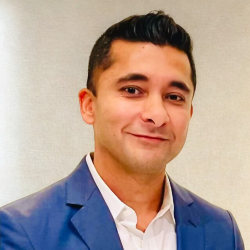This is a sponsored message.
Did you know that the first structured clinical trial began in the mid-18th century? A physician named James Lind wanted to find a way to treat scurvy, so he set up an experiment where he prescribed sailors different foods and monitored their symptoms. He found that eating citrus fruits, rich in Vitamin C, offered a potential solution.
Fast-forward to the 21st century, and clinical trials have become much more robust and regulated, with pharmaceutical research focused on discovering and developing novel therapeutic options to address complex diseases. While we now have far more sophisticated tools at our disposal, we continue to approach clinical trials with the same curiosity as James Lind: to better understand and find the best ways to safely and effectively treat a disease or restore our health.
From Clinic to Clinical Trials
As a former practitioner in rheumatology, I’ve seen first-hand how patients can be impacted by life-limiting immune-mediated diseases when there are few treatment options available. I was always impressed by the willingness of patients to participate in clinical trials, even knowing that they may not receive any personal benefit. Not only can their participation in an individual trial potentially help others in the future living with the same disease, but the data from this trial can be added to global databases that can be mined to inform future development using novel tools supported by digital innovations, including artificial intelligence.
As a doctor I always understood the importance of clinical trials, but my roles in pharmaceutical development have given me a greater appreciation for how clinical trials allow us to answer the really big questions in healthcare. At a macro scale, it’s about driving innovation; and at a micro scale, it’s about giving hope to individual patients.
Innovation in Clinical Trials
The way we conduct clinical trials is evolving rapidly. At Sanofi, we are exploring the use of new technologies like digital twins, which allow our scientists to create virtual replicas of patients. While real patients are still essential in late-stage studies, virtual patients allow us to test our novel drug candidates before moving them into the clinic. They can also help to supplement data collected in human clinical trials and therefore minimize the use of placebo.
Another exciting innovation which puts the patient at the center of data collection is remote monitoring. With wearable sensors and mobile devices, real-time data can be collected from clinical trial participants, reducing the need for frequent in-person visits, which can be a barrier for patients who live in remote areas or are unable to travel due to disability or life commitments. By addressing these barriers, we have an opportunity to increase the diversity and therefore the applicability of our clinical trials to a broader population. These digital technologies are also playing a crucial role in improving the efficiency and speed of clinical trials, helping to deliver transformative medicines to patients faster than ever before.
Seeing the Impact of Clinical Research
Across therapy areas, there are still too many conditions that we can only treat with symptomatic care. Clinical trials that are assessing the potential of new molecules that target disease drivers, rather than symptoms, have the potential to change the future for hundreds of millions of people around the world.
In chronic obstructive pulmonary disease (COPD), for instance, until now, we have primarily treated the symptoms. But COPD is a devastating disease that impacts a huge percentage of people globally.
Sanofi’s approach in COPD research is focused on targeting different types of chronic inflammation that are driving disease progression. This includes conducting basic and translational research, followed by clinical trials, to study how targeting a key molecule could potentially slow or reverse the progression of COPD. Through this kind of research, we are hoping to transform the way we treat COPD.
Driving Clinical Research Forward
The power of clinical research lies not just in individual trials, but in the collective knowledge we build together. From learning from every setback to celebrating every success, the determination and effort of both patients and researchers fuels a powerful cycle of discovery. The bravery of patients who contribute their time, combined with the relentless drive of researchers, ensures that each participant is contributing to something bigger. This collaboration drives the development of new treatments, increases the effectiveness of standards of care, and extends the reach of these medicines to more people worldwide, thus offering hope to patients, their families, and loved ones. As clinical researchers, your dedication and expertise are integral to shaping the future of medicine and improving the lives of countless individuals.
Authored by Alyssa Johnsen, MD, PhD, Senior Vice President, Global Therapeutic Area Head for Immunology and Oncology Development, Sanofi




